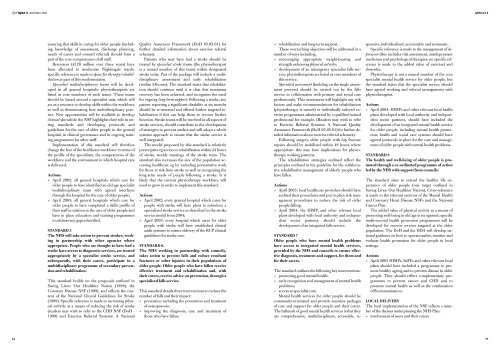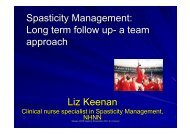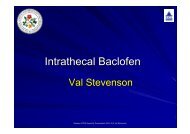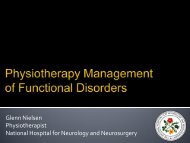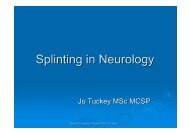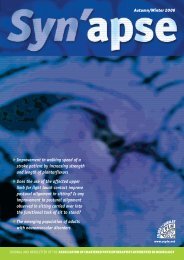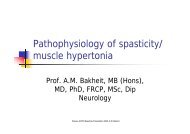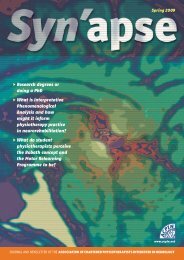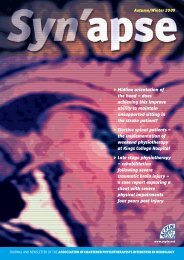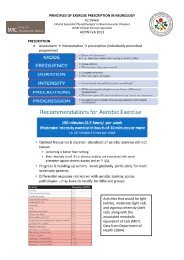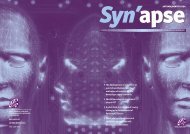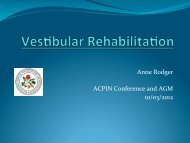SYNAPSE November 2001 - acpin
SYNAPSE November 2001 - acpin
SYNAPSE November 2001 - acpin
You also want an ePaper? Increase the reach of your titles
YUMPU automatically turns print PDFs into web optimized ePapers that Google loves.
Syn’apse ● AUTUMN <strong>2001</strong><br />
ARTICLE 4<br />
ensuring that skills in caring for older people (including<br />
knowledge of assessment, discharge planning,<br />
needs of carers and onward referral) should form a<br />
part of the core competencies of all staff.<br />
Resources (£120 million over three years) have<br />
been allocated to modernise Nightingale wards:<br />
specific reference is made to space for therapy/ rehabilitation<br />
as part of this modernisation.<br />
Specialist multidisciplinary teams will be developed<br />
in all general hospitals: physiotherapists are<br />
listed as core members of such teams. These teams<br />
should be based around a specialist unit, which will<br />
act as a resource to develop skills within the workforce<br />
as well as disseminating best multidisciplinary practice.<br />
New opportunities will be available to develop<br />
clinical specialists: the NSF highlights their role in setting<br />
standards and developing protocols and<br />
guidelines for the care of older people in the general<br />
hospital; in clinical governance and in ongoing training<br />
programmes for other staff.<br />
Implementation of this standard will therefore<br />
change the face of the healthcare workforce in terms of<br />
the profile of the specialism, the competencies of the<br />
workforce and the environment in which hospital care<br />
is delivered.<br />
Actions<br />
• April 2002: all general hospitals which care for<br />
older people to have identified an old age specialist<br />
multidisciplinary team with agreed interfaces<br />
through the hospital for the care of older people;<br />
• April 2003: all general hospitals which care for<br />
older people to have completed a skills profile of<br />
their staff in relation to the care of older people and<br />
have in place education and training programmes<br />
to address any gaps identified.<br />
STANDARD 5<br />
The NHS will take action to prevent strokes, working<br />
in partnership with other agencies where<br />
appropriate. People who are thought to have had a<br />
stroke have access to diagnostic services, are treated<br />
appropriately by a specialist stroke service, and<br />
subsequently, with their carers, participate in a<br />
multidisciplinary programme of secondary prevention<br />
and rehabilitation.<br />
This standard builds on the proposals outlined in<br />
Saving Lives: Our Healthier Nation (1998), the<br />
Coronary Disease NSF (1999), and reflects the content<br />
of the National Clinical Guidelines for Stroke<br />
(1999). Specific reference is made to increasing physical<br />
activity as a means of reducing the risk of stroke<br />
(readers may wish to refer to the CHD NSF (DoH -<br />
1999) and Exercise Referral Systems: A National<br />
Quality Assurance Framework (DoH 05.05.01) for<br />
further detailed information about exercise referral<br />
schemes).<br />
Patients who may have had a stroke should be<br />
treated by specialist stroke teams (the physiotherapist<br />
is a named member of this team) within designated<br />
stroke units. Part of the package will include a multidisciplinary<br />
assessment and early rehabilitation<br />
(within 24hours). The standard states that rehabilitation<br />
should continue until it is clear that maximum<br />
recovery has been achieved, and recognises the need<br />
for ongoing long-term support. Following a stroke, any<br />
patient reporting a significant disability at six months<br />
should be re-assessed and offered further targeted rehabilitation<br />
if this can help them to recover further<br />
function. Stroke teams will be involved in all aspects of<br />
stroke services, should contribute to the development<br />
of strategies to prevent strokes and will adopt a whole<br />
systems approach to ensure that the stroke service is<br />
well integrated.<br />
The model proposed by this standard is relatively<br />
prescriptive eg access to rehabilitation within 24 hours<br />
of stroke, weekly meetings of the stroke team. The<br />
standard also increases the size of the population accessing<br />
healthcare eg by including preventative work<br />
for those at risk from stroke as well as recognising the<br />
long-term needs of people following a stroke. It is<br />
likely that the current physiotherapy workforce will<br />
need to grow in order to implement this standard.<br />
Actions<br />
• April 2002: every general hospital which cares for<br />
people with stroke will have plans to introduce a<br />
specialised stroke service as described in the stroke<br />
service model from 2004;<br />
• April 2003: every hospital which cares for older<br />
people with stroke will have established clinical<br />
audit systems to ensure delivery of the RCP clinical<br />
guidelines for stroke care.<br />
STANDARD 6.<br />
The NHS working in partnership with councils,<br />
takes action to prevent falls and reduce resultant<br />
fractures or other injuries in their populations of<br />
older people. Older people who have fallen receive<br />
effective treatment and rehabilitation and, with<br />
their carers, receive advice on prevention, through a<br />
specialised falls service.<br />
This standard details three interventions to reduce the<br />
number of falls and their impact:<br />
• prevention including the prevention and treatment<br />
of osteoporosis;<br />
• improving the diagnosis, care and treatment of<br />
those who have fallen;<br />
• rehabilitation and long-term support.<br />
These overarching objectives will be addressed in a<br />
number of ways including:<br />
• encouraging appropriate weight-bearing and<br />
strength enhancing physical activity;<br />
• development of an interagency specialist falls service:<br />
physiotherapists are listed as core members of<br />
this service.<br />
Specialist assessment (building on the single assessment<br />
process) should be carried out by the falls<br />
service in collaboration with primary and social care<br />
professionals. This assessment will highlight any risk<br />
factors and make recommendations for rehabilitation<br />
(physiotherapy is named) or individually tailored exercise<br />
programmes administered by a qualified trained<br />
professional for example. (Readers may wish to refer<br />
to Exercise Referral Systems: A National Quality<br />
Assurance Framework (DoH 05.05.01) for further detailed<br />
information about exercise referral schemes).<br />
Following surgery, older people with hip fracture<br />
repairs should be mobilised within 48 hours where<br />
appropriate: this may have implications for physiotherapy<br />
working patterns.<br />
The rehabilitation strategies outlined reflect the<br />
principles outlined in the guideline for the collaborative<br />
rehabilitative management of elderly people who<br />
have fallen.<br />
Actions<br />
• April 2003: local healthcare providers should have<br />
audited their procedures and put in place risk management<br />
procedures to reduce the risk of older<br />
people falling;<br />
• April 2004: the HIMP, and other relevant local<br />
plans developed with local authority and independent<br />
sector partners, should include the<br />
development of an integrated falls service.<br />
STANDARD 7<br />
Older people who have mental health problems<br />
have access to integrated mental health services,<br />
provided by the NHS and councils to ensure effective<br />
diagnosis, treatment and support, for them and<br />
for their carers.<br />
The standard outlines the following key interventions:<br />
• promoting good mental health;<br />
• early recognition and management of mental health<br />
problems;<br />
• access to specialist care.<br />
Mental health services for older people should be<br />
community-orientated and provide seamless packages<br />
of care and support for older people and their carers.<br />
The hallmark of good mental health services is that they<br />
are comprehensive, multidisciplinary, accessible, responsive,<br />
individualised, accountable and systematic.<br />
Specific reference is made to the management of depression<br />
(this includes risk assessment, antidepressant<br />
medicines and psychological therapies: no specific reference<br />
is made to the added value of exercise) and<br />
dementia.<br />
Physiotherapy is not a named member of the core<br />
specialist mental health service for older people, but<br />
the standard states that the specialist service should<br />
have agreed working and referral arrangements with<br />
physiotherapists.<br />
Actions<br />
• April 2004: HIMPs and other relevant local health<br />
plans developed with local authority and independent<br />
sector partners, should have included the<br />
development of an integrated mental health service<br />
for older people, including mental health promotion;<br />
health and social care systems should have<br />
agreed protocols in place for the care and management<br />
of older people with mental health problems.<br />
STANDARD 8<br />
The health and well-being of older people is promoted<br />
through a co-ordinated programme of action<br />
led by the NHS with support from councils.<br />
The standard aims to extend the healthy life expectancy<br />
of older people (one target outlined in<br />
Saving Lives: Our Healthier Nation). Cross-reference<br />
is made to the relevant sections of the Mental Health<br />
and Coronary Heart Disease NSFs and the National<br />
Cancer Plan.<br />
The added value of physical activity as a means of<br />
promoting well-being in old age is recognised; specific<br />
multi-sectoral health promotion programmes will be<br />
developed for exercise services targeted at the older<br />
population. The DoH and the HDA will develop national<br />
guidance on how to operationalise, monitor and<br />
evaluate health promotion for older people in local<br />
settings.<br />
Actions<br />
• April 2003 HIMPs, SaFFs and other relevant local<br />
plans should have included a programme to promote<br />
healthy ageing and to prevent disease in older<br />
people. They should reflect complementary programmes<br />
to prevent cancer and CHD and to<br />
promote mental health as well as the continuation<br />
of flu immunisation.<br />
LOCAL DELIVERY<br />
The local implementation of the NSF reflects a number<br />
of the themes underpinning the NHS Plan:<br />
• involvement of users and their carers<br />
16<br />
17


